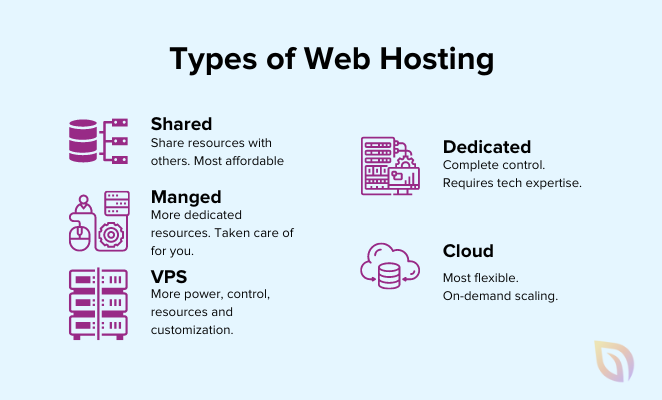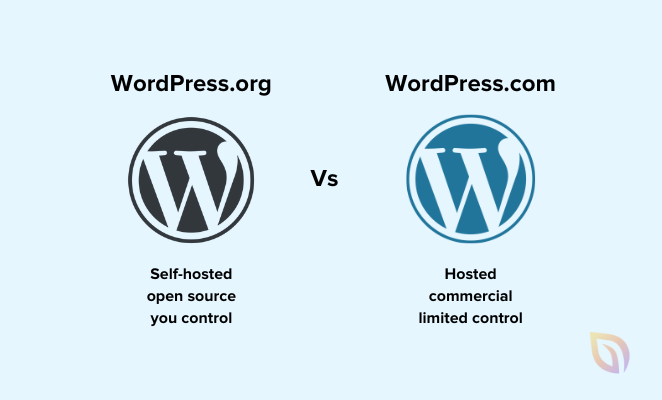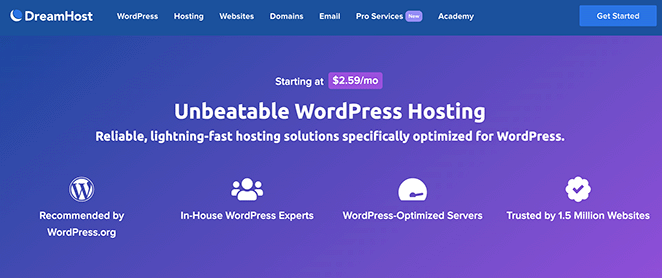Do you want to know how to choose the best WordPress hosting?
Choosing the right WordPress hosting is essential for a fast, secure, and successful website. It’s like picking the right house for your online presence. The wrong host can make your site slow, vulnerable to attacks, and unable to grow with you.
Factors like your website’s size, how many visitors you expect, and your budget will all help guide your hosting decision.
In this guide, I’ll lead you through the world of WordPress hosting and help you find the best fit for your needs.
Table of Contents
How to Choose the Best WordPress Hosting
Before we dive into specific hosting providers, let’s explore the key factors that help you make the perfect WordPress hosting choice.
Types of Hosting

Choosing the right type of hosting is the first big decision you’ll make. Think of it like choosing your website’s neighborhood.
- Shared hosting is the most affordable option. You’ll share resources with other websites, which can impact performance sometimes.
- Managed WordPress hosting gives you far more dedicated resources. It’s like having a management team taking care of updates, security, and optimizing everything specifically for WordPress.
- If you need even more power and control, VPS hosting offers a good middle ground. It gives you more resources and customization.
- Dedicated hosting is the ultimate, giving you complete control. However, it requires the most technical expertise and budget.
- Finally, cloud hosting brings flexibility and on-demand scaling, making it a great choice for sites that experience unpredictable traffic surges.
Performance and Speed
Beyond the type of hosting, performance and speed are essential. Look for ample server resources (think RAM and CPU), reliable uptime guarantees (99.9% or higher), and technology like CDNs and caching to reduce load times.
Scalability is key, too. Ensure your hosting plan can grow with your website as traffic increases and your site becomes more complex.
Security should be a top priority. Robust firewalls, malware protection, and automatic backups are crucial for protecting your website.
When things do go wrong, you also want responsive and knowledgeable customer support available 24/7 (ideally through multiple channels like phone, chat, and email).
Finally, pricing is always a factor. Remember to balance the cost of a plan with the performance, security, and features vital to your website’s success.
Should I Host My Own WordPress Site?
While traditional hosting providers offer convenience, some people choose to self-host their WordPress site. This path offers more control but demands a whole different skill set.

Here’s a breakdown of what it means to self-host a WordPress website:
- WordPress.org (self-hosting): This is the open-source software that powers WordPress websites. It’s free to download and use, but you need to take care of everything else yourself.
- WordPress.com: This is a commercial platform that provides a simple way to get a WordPress website up and running. They manage the hosting and much of the technical side for you.
Deciding whether to self-host your WordPress site depends on your needs and priorities. Here’s a breakdown of the pros and cons to help you make the right choice:
Pros of Self-Hosting
- Complete Control: You have full say over every aspect of your website, from design to functionality to monetization strategies.
- Customization: You can install any plugins or themes you like, offering more design and functionality options.
- Scalability: You can adjust your hosting resources (memory, storage, bandwidth) as your site grows.
- Potential for monetization: You can use advertising, affiliate programs, or sell products/services without restrictions.
Cons of Self-Hosting
- Cost: It’s typically more expensive than a basic WordPress.com plan, as you need to pay for a domain name and hosting.
- Technical Knowledge: You need a willingness to learn basic website management, updates, security, and troubleshooting.
- Responsibility: You’re solely responsible for maintaining backups and security and ensuring your site runs smoothly.
- Potential Complexity: If you want a lot of customization, self-hosting can become more complex.
Overall, if you need deep customization and are comfortable with the technical side, self-hosting allows absolute freedom over your website’s environment. However, if you’re blogging casually and don’t need complete control or monetization, WordPress.com’s free or basic plans might suffice.
Popular WordPress Hosting Providers
With so many options, choosing a hosting provider can feel overwhelming. Here’s a breakdown of some popular choices I’ve hand-picked to help narrow down the best fit for your website.
1. Bluehost WordPress Hosting

Bluehost is the best WordPress hosting provider and an excellent option for getting started. They’re an official WordPress-recommended hosting provider and the #1 choice for small businesses.
Bluehost has several different web hosting options, including shared WordPress hosting, VPS hosting, and dedicated hosting services. You can start with the shared hosting plan if you’re a beginner.
By opting for this WordPress hosting plan, you share your server with several other websites. Plus, it’s a good option if you’re looking for something budget-friendly.
Bluehost offers free domain names for the first year, SSL functionality, automatic WordPress installation, daily backups, and round-the-clock support. You can also access the Bluehost marketplace for premium WordPress themes and plugins at exclusive prices.
Additionally, you won’t have to worry about uptime and bandwidth because Bluehost offers 100% uptime, fast page loading speeds, and unmetered, unlimited bandwidth and web space. Moreover, this solution provides 24/7 support, including email, live chat, and phone support, so help is always available when you need it.
Bluehost Pros and Cons
Now let’s look at the pros and cons I’ve faced when using Bluehost:
- Pros: Officially recommended by WordPress.
- Pros: Free website staging.
- Pros: Free CDN with unlimited storage and unmetered bandwidth.
- Pros: Free WordPress themes and plugins included, like WPForms and OptinMonster.
- Cons: Support can be slow at times.
- Cons: It does not automatically come with All in One SEO installed.
Bluehost Pricing
| Plan | Monthly Price | Regular Price | Websites | Storage | Free SSL |
|---|---|---|---|---|---|
| Basic | $2.95/mo* | $11.99/mo | 1 | 10 GB | Yes (1st year) |
| Plus | $5.45/mo* | $16.99/mo | 2 | 20 GB | Yes |
| Choice Plus | $5.45/mo* | $21.99/mo | 3 | 40 GB | Yes |
| Pro | $13.95/mo* | $28.99/mo | 5 | 100 GB | Yes |
Get started with Bluehost today.
For more details, you can check out this Bluehost hosting review.
2. SiteGround WordPress Hosting

SiteGround is a brilliant hosting provider for WordPress sites. It’s known for its excellent support and fast, reliable, hassle-free hosting plans.
Like Bluehost, SiteGround offers dedicated WordPress-optimized hosting plans. You can also opt for the one-click WordPress install option that helps you get started right away.
Some of the services include automatic updates, instant setup of Cloudflare’s free CDN, and SSL certificates from Let’s Encrypt. It also offers a 1-click WordPress staging test site, the latest PHP versions, daily WordPress backups, built-in caching, 99.9% uptime, and excellent response and load times.
SiteGround has a managed WooCommerce hosting solution if you have an eCommerce business, and their customer support team is second to none.
Their server infrastructure is powered by Google Cloud with built-in high-performance features like Ultrafast PHP, SG Optimizer, and more to give even an entry-level website a cloud hosting experience.
SiteGround Pros and Cons
Now let’s look at the pros and cons I’ve faced when using SiteGround:
- Pros: Excellent WordPress support, with fast speed and free SSL.
- Pros: Advanced security features running on the Google Cloud platform.
- Pros: Several data centers running across the world.
- Pros: Free website migration.
- Pros: Includes powerful tools and plugins like AIOSEO, OptinMonster, WPForms, and more.
- Cons: No free domain and higher pricing for premium hosting.
SideGround Pricing
| Plan | Monthly Price | Regular Price | Websites | Storage | Free SSL |
|---|---|---|---|---|---|
| StartUp | $2.99 | $11.99 | 1 | 10 GB | Yes |
| GrowBig | $4.99 | $19.99 | Unlimited | 20 GB | Yes |
| GoGeek | $8.99 | $29.99 | Unlimited | 40 GB | Yes |
For the best performance, I suggest the GrowBig or GoGeek plans that come with Ultrafast PHP and good scalable options.
Get started with SiteGround today.
3. DreamHost WordPress Hosting

DreamHost is another popular WordPress web hosting provider, hosting millions of websites. It also has over 400,000 happy customers from over 100 different countries. Plus, it’s an officially recognized WordPress.org hosting platform with PCI-compliant hosting.
DreamHost has all the features you need to start a WordPress site and includes 1-click WordPress installation to make getting started much easier.
All plans include a free domain name with free domain privacy, a free website firewall, and a free SSL certificate. It’s an excellent choice if you need a WordPress host that offers easy website creation and high-speed SSD storage.
DreamHost Pros and Cons
Now let’s look at the pros and cons I’ve face when using DreamHost:
- Pros: Great speed, free SSL and domain with privacy protections, and 1-click WordPress installation.
- Pros: Officially recommended by WordPress.
- Pros: Free web application firewall.
- Pros: Free automated WordPress migration.
- Pros: Access powerful WordPress plugins and tools, including AIOSEO, WPForms, and more.
- Pros: Shared unlimited plan includes unlimited emails.
- Cons: The hosting control panel (Cpanel) is somewhat outdated.
DreamHost Pricing
| Plan | Monthly Price | Regular Price | Websites | Storage | Free SSL |
|---|---|---|---|---|---|
| WordPress Basic | $2.59 | $3.95 | 1 | Unlimited | Yes |
| DreamPress (Starter) | $16.95 | $29.95 | 1 | 30 GB | Yes |
| DreamPress (Professional) | $24.95 | $49.95 | Unlimited | Unlimited | Yes |
| VPS WordPress (Starter) | $10.00 | $16.95 | 1 | 30 GB | Yes |
| VPS WordPress (Managed) | $25.00 | $39.95 | 1 | 60 GB | Yes |
| WooCommerce Hosting (Starter) | $16.95 | $29.95 | 1 | 30 GB | Yes |
| WooCommerce Hosting (Professional) | $24.95 | $49.95 | Unlimited | Unlimited | Yes |
Get started with DreamHost today.
4. Hostinger WordPress Hosting

Hostinger is a popular choice for WordPress websites because it’s incredibly affordable. This makes it a great option for people on a budget or those just starting out with WordPress.
Even though it’s cheap, Hostinger still offers good performance and reliable service, so your website stays up and running.
If you have any questions or need help, Hostinger provides 24/7 live chat support. This is especially helpful for those who are new to web hosting.
Many Hostinger plans also include freebies like a domain name, SSL certificate (for security), and easy website-building tools, making it even easier to get your website launched.
Hostinger Pros and Cons
Now let’s look at the pros and cons I’ve faced when using Hostinger:
- Pros: Great speed, free SSL, domain, and email accounts.
- Pros: Cheapest plan starts from $1.99 per month with 30GB of disk space.
- Pros: 30-day money-back guarantee.
- Pros: Managed auto updates and WordPress acceleration built-in.
- Pros: Choose from multiple data centers.
- Pros: Includes powerful WordPress plugins and tools like MonsterInsights, WPForms, AIOSEO, and OptinMonster.
- Cons: High renewal fees.
Hostinger Pricing
| Plan | Monthly Price | Regular Price | Websites | Storage | Free SSL |
|---|---|---|---|---|---|
| Premium | $2.49 | $7.95 | 1 | 10 GB | Yes |
| Business | $3.69 | $8.95 | 100 | 20 GB | Yes |
| Cloud Startup | $8.99 | $29.95 | Unlimited | 30 GB | Yes |
Get started with Hostinger today.
5. HostGator WordPress Hosting

HostGator is another popular web host for many website owners. By signing up for the HostGator plan, you can have a domain name for free for a whole year.
It comes with 5 different hosting packages with prices that fit various budgets. Like the other hosting companies in this article, this one also offers dedicated hosting for WordPress users with 1-click WordPress installations.
HostGator has several add-on tools to build your website and offers 99.9% uptime.
You can use their free site migration services if you’re a new HostGator account holder. If you’ve previously hosted your site with another hosting company, you can easily migrate it to HostGator at zero cost.
HostGator Pros and Cons
Now let’s look at the pros and cons I’ve faced when using HostGator:
- Pros: Fast with 24/7 support
- Pros: Cheap prices for the first year and free migration
- Pros: Free domain and free SSL
- Cons: Renewal fees are high
HostGator Pricing
| Plan | Monthly Price (Promo) | Regular Price | Websites | Storage | Free SSL |
|---|---|---|---|---|---|
| Hatchling | $2.75 | $5.95 | 1 | 10GB SSD | Yes |
| Baby | $3.95 | $9.95 | Unlimited | Unlimited SSD | Yes |
| Business | $9.95 | $19.95 | 3 | Unlimited SSD | Yes |
Get started with HostGator today.
More Questions About WordPress Hosting
– Shared Hosting: Cheapest option, like renting a room (usually $5-$15 per month)
– Managed WordPress Hosting: More features and support, like having a house manager (around $20-$50 per month or more)
– VPS or Dedicated Hosting: Most control, meant for bigger sites, like owning your house (pricier, can be $50+ per month)
Choosing the Best Host for You
With so many options, picking a host can feel tricky. Here’s how to make it easier:
- Your Needs Come First: Do you have a small website or a big one? Do you need it to load super fast? How much can you spend each month? The “best” host is the one that matches what your website needs.
- Room to Grow: Think about the future. Choose a hosting plan that can handle your website getting bigger and more popular.
- Try Before You Buy: Many hosts offer free trials or money-back guarantees. This lets you test them out before committing for the long term.
It’s okay to start small. If you’re unsure, start with a basic shared hosting plan. You can always upgrade to a more powerful option later, as your website needs more resources.
What’s the Best WordPress Hosting?
If you’re ready to choose the best WordPress hosting for your site, I have a few suggestions.
- Bluehost is the best all-around WordPress hosting thanks to its user-friendly interface, competitive pricing, and easy WordPress installation.
- I recommend SiteGround for eCommerce websites due to its WooCommerce hosting and industry-leading support.
- Hostinger is the best WordPress hosting for small businesses.
That said, all of the top WordPress hosting companies mentioned above offer excellent uptime, fast servers, quality support, and incredibly low prices, so you can’t go wrong.
Choose Your WordPress Hosting Today
I hope this guide has helped you learn how to choose the best WordPress hosting. Take some time to think about what matters most to you. Is it price, speed, or super-friendly customer support?
Once you know what’s important, it’s much easier to compare different hosting companies and find your perfect match. Don’t be afraid to ask questions and try things out before making a long-term decision.
The right hosting choice will set up your WordPress website for success.
After choosing your host, check out these additional resources to help you build a successful WordPress site:
- How to Create a WordPress Website for Beginners
- How to Set Up an Online Store in WordPress
- Most Popular WordPress Themes
- Best WordPress Plugins
- How to Create a WordPress Coming Soon Page
- How to Create a New Website Launch Marketing Plan
- How to Rank a New Website
Thanks for reading! We’d love to hear your thoughts, so please feel free to leave a comment with any questions and feedback.
You can also follow us on YouTube, X (formerly Twitter), and Facebook for more helpful content to grow your business.





